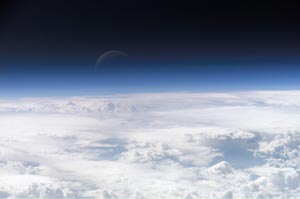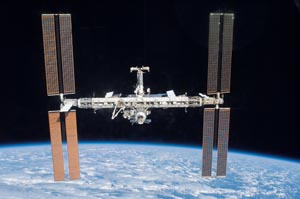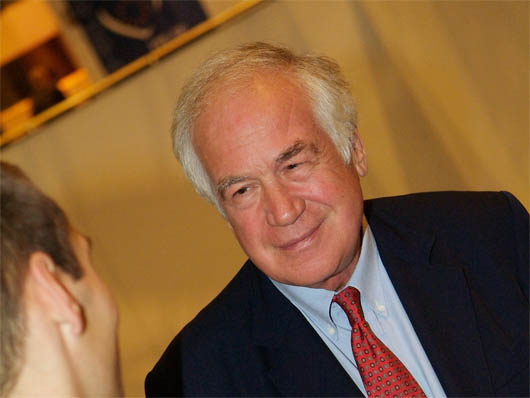Rede von Karl von Wogau bei der Anhörung des Europäischen Parlaments zum Thema "Bemannte Raumfahrt"
Thank you very much for inviting me to this event.
As the EP rapporteur for space and security, EU space policy is dear to my heart.
In my presentation I will focus on EU's security objectives in this domain, which could be intrinsically intertwined with human exploration of space.
I would like to emphasise 3 areas of crucial importance, all of which are mentioned in the resolution of the European Parliament of July this year.
 Firstly, space exploration must go hand in hand with its peaceful use. The European Union should strongly push forward the ongoing discussions about this matter. The present regime must not only reconfirmed. Its scope should expand to prohibit all weapons in space.
Firstly, space exploration must go hand in hand with its peaceful use. The European Union should strongly push forward the ongoing discussions about this matter. The present regime must not only reconfirmed. Its scope should expand to prohibit all weapons in space.
Such legal measures should preclude from possible direct attack as well as prevent from debris created by missile tests in outer space. Let me remind you that the massive debris cloud caused by the Chinese missile test in January last year, still threatens all orbiting satellites. Therefore the international community must strive for the adoption of legally binding international instruments focusing on banning the use of weapons against space assets.
The regime should be strengthened so as to regulate and protect non-aggressive space uses. All efforts aimed at strengthening transparency and confidence-building measures, such as a comprehensive Code of Conduct on Space Objects should be welcome. Further peaceful exploration of space and possible colonisation and extraction of valuable raw resources from celestial bodies, will all heavily depend on such international legal regime. I call on the EU, Presidency and Commission alike, to do their utmost best to promote these legal measures.
Secondly, we have to prevent the militarisation of space not only due to the possible severe consequences for humanity, but also in order to secure autonomous access to space.
The EU needs a secure, independent and sustainable access to space for strategic and economic reasons. To this end, the European Parliament recommended that a strategic long-term investment programme in new European launchers be initiated as quickly as possible, in order to keep up with the rising global competition.
To be more specific, it will be necessary to increase the development effort in order for an enhanced Ariane 5 to be available in 2015 at the latest.
Moreover, I strongly recommend that European non-commercial satellites should be carried into orbit by European launchers, preferably from the territory of the European Union.
 Thirdly, and lastly, the EU has to be prepared to protect its space infrastructure not only through legally binding international instruments, but actively as well.
Thirdly, and lastly, the EU has to be prepared to protect its space infrastructure not only through legally binding international instruments, but actively as well.
The first vital element will be the future European space situational awareness system, which I very much support. The joint EU-ESA initiative for a programme towards this system will be submitted at the ESA Council at Ministerial level later this month.
Further fundamental element must be a protection of the strategic ground infrastructures by armed forces.
Furthermore, I very much appreciate that the last Space Council in September this year approved an initiative providing Europe in future with a system for monitoring space debris presenting a hazard for orbiting satellites. This system will be absolutely critical for any future spacecraft carrying astronauts on-board.
Besides, we must find intelligent ways to protect our spacecraft from cyber-attacks and jamming.
I hope that the ESA Ministerial Council in November will take bold decisions which will enable Europe to remain in the first ranks, bearing in mind that countries like China and India have given their space programmes the highest priority.
As Chairman of our Subcommittee on Security and Defence I would also like to mention the importance of Space for the Security of our continent. First of all, let me remind you that our Security Strategy departs from a broad notion of security.
This notion covers the fight against natural disasters, humanitarian interventions and if necessary the intervention of armed forces.
In all these fields space assets are of the utmost importance. This concerns observation, navigation and telecommunication by satellites.
If you try to help people after a Tsunami you need pictures from satellites to assess the damages and to decide about priorities. The same is true in an armed conflict as for example Georgia. This is why it is necessary to make the pictures from Helios, SAR Lupe and Skymed available to our Satellite Centre in Torrejón. The next step must be the common project MUSIS which should be set into a European context. In the future these assets should be connected with the security part of GMES (Kopernikus).
As far as satellite based navigation is concerned, I think it is very important that we have decided to finance this project from the European budget. Let me remind you, that the European Parliament has recently decided with a large majority that this navigation system should also be available for operations in the context of the European Security and Defence Policy.
To conclude, allow me to touch briefly the question of human presence in space. I can see that Europe lies behind not only the US and Russia, but now China and perhaps in the near future India by 2015. I wonder if this is acceptable. Europe had already astronauts in space but they travelled on board the US shuttle or the Russian Soyuz. Nowadays, I think we have the capacity to develop a space vehicle which can carry people and use Ariane 5 to put them into Earth’s orbit. And just today I would like to say: Yes, we can.
However, according to my information there will be no European astronauts on board of a European space vehicle before as late as 2020(!). This is not only a question of pride but it can become, for many reasons, strategically important to have the capacity to do so.
Allow me to finish by wishing you a successful outcome of this mini-hearing.
I thank you for your attention.
